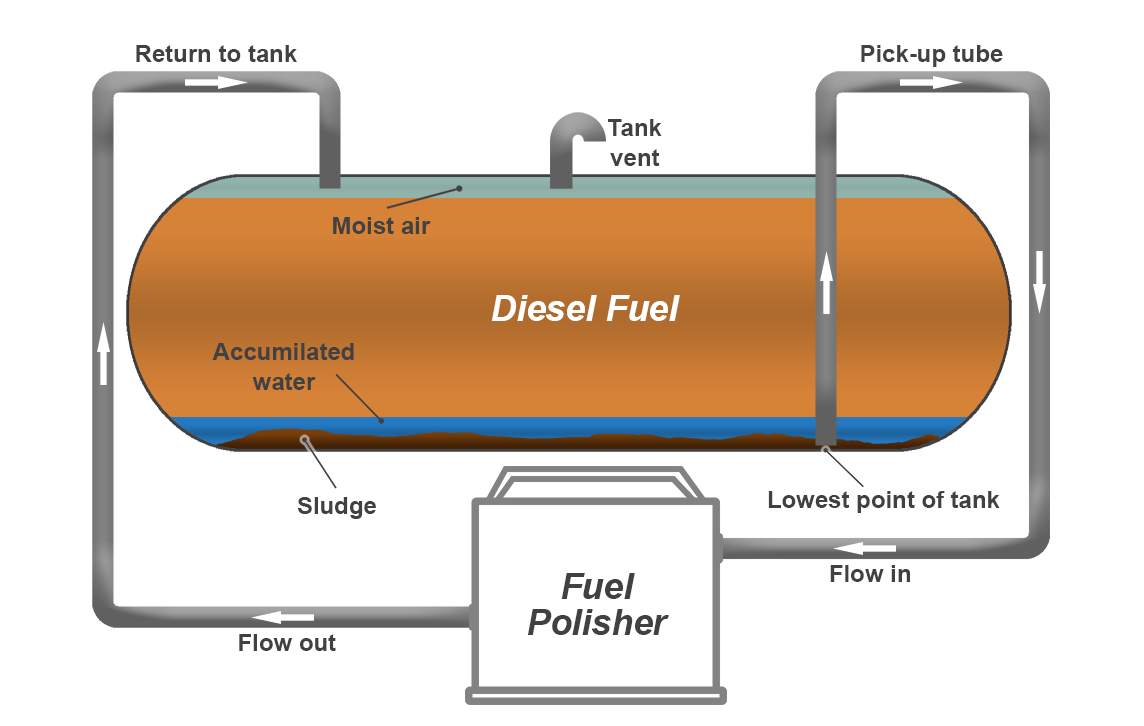Fuel Polishing – All Your Questions Answered
Here at Crown Oil, we’re often asked many questions about fuel polishing by our customers, and so we’ve put together this FAQ to help anyone considering diesel polishing to better understand its benefits, including that it’s a completely non-disruptive and cost-effective service to save your fuel.
Don’t let contamination be the weak link in your operation.
If you’d like to book our fuel tank polishing service, get in touch with our expert team today on 0330 123 1444 to discuss your current situation.

What is fuel polishing?
Fuel polishing is an advanced, mechanical cleaning process that removes harmful sediment through filtration and circulation such as water, sludge and microbial contamination (diesel bug).
Fuel is removed from the tank and filtered back into the existing tank or a new tank in optimum state, without any downtime to equipment or machinery in use.
Common fuels that are polished are red diesel (gas oil), diesel (derv), biodiesel and kerosene.
Is fuel polishing necessary?
If you’ve ever experienced engine breakdown, fuel starvation, blocked filters, water or any other contaminant in your fuel, then you need a fuel polishing system. The consequence of complete power failure could be the loss of millions of pounds in a data centre, loss of food overnight in a supermarket or catastrophically, loss of life in a hospital.
Whatever your application, (generators, storage tanks, marine vessels etc.) fuel polishing is the most simple and cost-effective way to protect from contamination.
When fuels are stored for long periods of time, and aren’t regularly tested and treated, diesel bugs build up and cause havoc in machinery, equipment and vehicles. Diesel polishing has the ultimate goal to keep the fuel usable without having to fork out money to replace it with a new batch.
Before fuel polishing services are carried out, the fuel must be analysed and tested so that the exact problem can be identified and treated with the most appropriate solution. If it’s too severely contaminated, it’s likely that it’s not salvageable and therefore polishing would be a waste of time and money.
To determine whether your fuel needs polishing, we use a particle counter to analyse your fuel’s condition to measure any unwanted particles that have accumulated in your tank. Using a traffic light system, we’ll provide a detailed insight into its quality; green indicates that the fuel meets current legislation, amber means that fuel is just under the required criteria and needs polishing and red which demonstrates that an intensive fuel polishing treatment is needed.
How does a diesel fuel polishing system work?
This is an advanced level filtration of fuel that is monitored and controlled using a central processing unit through a combination of depolymerisation and filtration. Fuel is passed through different equipment to progressively remove finer contaminants at different stages.
Several stages using different filter technologies are key, as a single process is not adequate to remove the solid particulates, water and wet foreign matter found.
The first stage of Crown Oil’s fuel tank polishing involves fuel being filtered through increasingly finer filters until its ‘clean’ and reaches a filtration level of 1 micron absolute – an industry best.
Once complete, our diesel fuel polishing unit then uses advanced depolymerising technology to break down harmful particulates to ‘polish’ your fuel to perfection.

Will fuel polishing disrupt my business?
No, the process will cause almost zero disruption to your operations. Equipment and machinery can carry on running while the fuel polishing equipment does its job as the fuel remains in the tank while the contaminants are filtered out.
How long will fuel polishing take?
The duration of a fuel polishing service depends on a number of factors, such as:
- Tank size
- Current quality of fuel
- Equipment used
- Amount of fuel being polished
Our advanced filtration system is a fast process that removes harmful contaminants simultaneously whilst minimising our time onsite. With Crown Oil, up to 25,000 litres of fuel can be polished within 1 hour.
How often should diesel fuel be polished?
This depends entirely on the application. We recommend the process at least once a year if the stored fuel is intended for back-up power. In critical facilities such as hospitals and data centres, to ensure there’s no halt in operations, we recommend a treatment every 2 years at least.
How does fuel become contaminated?
2011 saw the introduction of revisions to the EN590 fuel regulation. This led to an increase in biodiesel content and a reduction in sulphur content to virtually zero.
Contaminants ideally need to be caught by the primary filters, however bacteria (the most common contaminant) is generally a large biomass quantity that will quickly block filters – and if left untreated, can double in size every 20 minutes.
What are the benefits of fuel polishing?
Reduced costs – When fuel is contaminated, many people get their fuel uplifted and replaced as a quick solution. But with moderate contaminant levels, fuel can be polished and dosed with the necessary additive/biocide which is less expensive, less wasteful and more environmentally-friendly.
Non-disruptive – Our polishing units connect to your fuel supply in a parallel fashion, so your infrastructure can carry on functioning while the supply is polished. That way, your fuel is restored to perfection without halting your operations.
Are all fuel polishing systems the same?
Simply put, no. Systems can filter different quantities of fuel at different rates, for example some systems filter big quantities of fuel quickly, whereas others will filter small quantities at a slower pace.
Another difference is that there’s a huge difference in the quality of the polished fuel – many companies do not have the functionality to filter out water. Unfortunately, this means that diesel bacteria will continue to grow 260,000 times every 6 hours, leaving your expensive systems at high risk.
How will I know if fuel is sufficiently cleaned?
Water content and particle size are the two main measures of fuel contaminants.
The first indication of how effective your diesel polishing has been will be to look at your fuel’s visual appearance. It should appear bright and clear with no visible signs of free water, sediment and particulate.
However, if fuel has been polished but still contains particles greater than around 5 microns, your equipment remains at great risk. Even if you can’t see any water, there will still water suspended in the fuel itself which will enhance bacteria growth. Water level is measured in parts per million (ppm).
Crown Oil’s fuel polishing equipment filters to below 1 micron and removes water to 100ppm – an industry best!
What affects the speed of fuel polishing systems?
Using a pump, contaminated fuel is pushed through filters; it’s harder to force contaminated fuel through a finer filter, so higher quality results usually take longer to achieve. What’s more, a system that uses higher pressure will result in more rapid filtration.
High-speed and high-quality filtration need high pressure and finer filters, meaning the larger the volume of fuel, the more powerful the equipment needed.
I add additives to my fuel; do I still need a fuel polishing service?
Additives slow fuel degradation but they don’t completely prevent the build up of contaminants that form in a tank. Therefore, a combination of fuel polishing and additives are needed to fully protect your fuel operation.
How much does fuel polishing cost?
Due to its intricacy and involvement of highly specialised equipment, lots of people think that fuel polishing is expensive. However, it’s actually one of the most cost-effective treatments available when looking at all considerations, such as:
- No need to buy replacement batch of fresh fuel
- Minimal disruption to services
- Avoids the cost and waste of disposing of a contaminated supply
I’m new to fuel polishing, where can I find out more?
Trying to decipher which service will best suit your requirements and budget can be daunting. We recommend booking a Free Site Survey where we can identify any fuel related problems, and fix with the appropriate solution.
Fuel polishing near me?
Crown Oil provides a vast range of diesel fuel polishing equipment for large and small enterprises. Our systems filter out particulates to under 1 micron, which makes us one of the only companies that reach this high level of cleaning. The quality of our equipment speaks for itself, so contact us today to learn more.
Video explainer on fuel polishing
Watch our short explanatory video on our completely non-disruptive fuel polishing service to help you get the most out of your assets.
If you have any other questions about fuel polishing or if you’re unsure how it could help you or your business. Get in touch with our fuel polishing experts today on 0330 123 1444 to discuss you own requirements and to see how we could help you.





